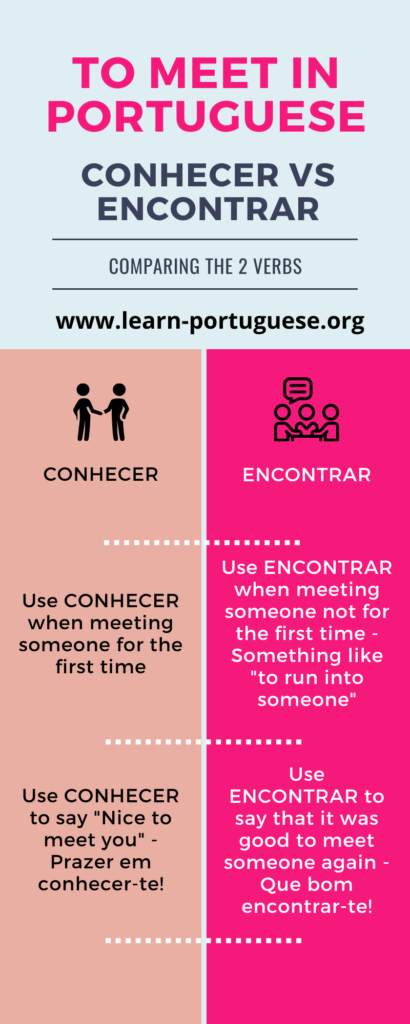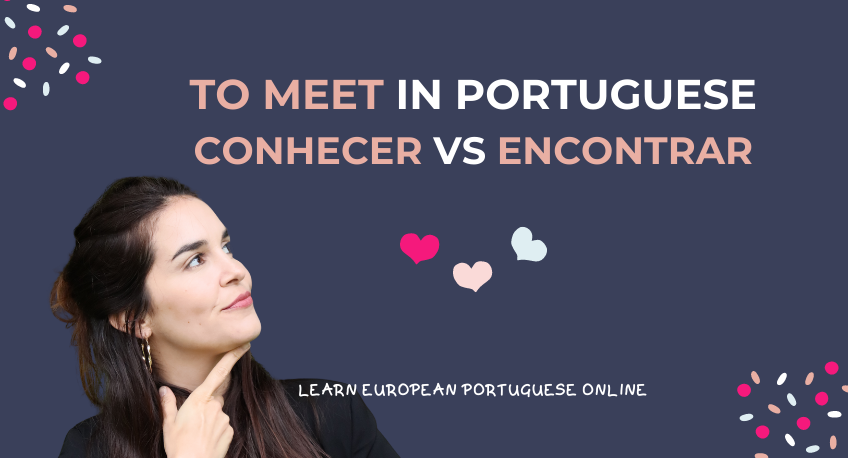In today’s post I will discuss another pair of verbs that cause confusion and I will tell you how you can say to meet in Portuguese.
As you know, Portuguese has some problematic pairs of verbs that English speakers have trouble telling apart. That is the case of the verbs saber vs conhecer, for example.
But if you thought conhecer only caused trouble when used as to know, think again 🙂 Conhecer likes being problematic at times, and it can also cause confusion when used to convey the meaning of to meet.
You can also watch me speaking about this topic on YouTube:
The difference between conhecer and encontrar
Both verbs – conhecer and encontrar – can be translated in certain contexts as to meet. However, they can’t be used interchangeably, as they encompass two different meanings.
Take a look:
Eu conheci o teu irmão na festa da Cristina – I met your brother at Cristina’s party.
Eu encontrei o teu irmão na festa da Cristina – I met your brother at Cristina’s party.
Both sentences are translated the same, but do they mean the same? The short answer is no.
Continue reading to find out more 🙂
The verb conhecer in Portuguese
First let me tell you its conjugation, so we can take it out of the way. So it goes like this:
Eu conheço
Tu conheces
Você/ Ele/ Ela conhece
Nós conhecemos
Vocês conhecem
Eles/ Elas conhecem
As you can see, this verb is regular in the Present Simple, except for the spelling of the first person – conheço.
I am not going into detail about why this is so, but if you want you can check my European Portuguese Master Course, where I explain this and much more.
Also, if you want to check how to conjugate this verb in other tenses, feel free to check conjuga-me.net.
The use of the verb conhecer in Portuguese
So, now that we have tackled the conjugation of the verb to meet in Portuguese, let’s check its use.
We use this verb to speak about meeting someone for the first time.
Therefore, in the sentence:
Eu conheci o teu irmão na festa da Cristina – I met your brother at Cristina’s party.
What we mean is that we met the brother of the person we are speaking with for the first time at Cristina’s party.
This is really important, so don’t forget it. This is the key not to misuse these two verbs.

The verb encontrar in Portuguese
Now that we checked the verb conhecer in Portuguese, let’s check the verb encontrar in Portuguese and how and when it is used.
The conjugation of this verb goes as follows:
Eu encontro
Tu encontras
Você/ Ele/ Ela encontra
Nós encontramos
Vocês encontram
Eles/ Elas encontram
This verb is regular in the Present Simple, which makes things easier if you want to use it 🙂
Again, feel free to check the conjugation of this verb in other tenses by going to conjuga-me.net.
The use of the verb encontrar in Portuguese
Opposite to conhecer, this verb is used when we want to say that we met someone, but not for the first time.
When we say something like:
Eu encontrei o teu irmão na festa da Cristina – I met your brother at Cristina’s party.
We are saying that we met the brother of the person we are talking to at Cristina’s party, but not for the first time. We already knew them from before the party and we just happened to saw them there again.
I guess this could also be better translated as – I ran into your brother at Cristina’s party.
How to say Nice To Meet You in Portuguese
Now that you know the difference between these two verbs, I am guessing it might be a bit clearer when to use one and when to use the other.
So, when you meet someone for the first time, you might want to say it was nice to meet them. How would you say that?
Well, since you are meeting them for the first time, you would use the verb conhecer.
Therefore, you would say:
Prazer em conhecer-te – Nice to meet you – (informal “Tu”)
Prazer em conhecê-lo/ Prazer em conhecê-la – (formal “Você” – masculine and feminine)
Prazer em conhecer-vos – Nice to meet you – (kind of informal “Vocês”)
Prazer em conhecê-los/ Prazer em conhecê-las – Nice to meet you – (formal “Os senhores/ As senhoras”)

If you want to make it simpler, you can also just simply say:
Prazer! – A pleasure
Foi um prazer! – It was a pleasure
So, as you can see, you have many ways of saying nice to meet you in Portuguese, but in all of them you never use the verb encontrar.
The only way you could use the verb encontrar in this context, would be if you are telling someone you already know that you were happy to meet them again. Then, you could say something like:
Que bom encontrar-te! – How good to meet you (again) – (informal “Tu”)
Que bom encontrá-lo/ encontrá-la! – How good to meet you (again) – (formal “Você” – masculine and feminine)
Que bom encontrar-vos! – How good to meet you (again) – (kind of informal “Vocês”)
Que bom encontrá-los! – How good to meet you (again) – (formal “Os senhores/ As senhoras”)
Don’t forget, you will only use this if you already knew the person/ people and if you want to say that you are happy to meet them once again.
Conclusion
In conclusion, the verbs conhecer and encontrar, when used as to meet in Portuguese, might cause some confusion.
However, the difference is quite simple:
- Use conhecer when meeting someone for the first time.
- Use encontrar when meeting someone not for the first time (you already previously knew the person)

And that’s it!
I hope this post about the verbs meaning to meet in Portuguese has made your life easier and that you can now use these two verbs – conhecer and encontrar – correctly.
Please leave a sentence in the comments below, in Portuguese, using one of these verbs (or even both, if you feel inspired).
Have fun learning Portuguese and don’t forget to come back for more posts about European Portuguese.
Beijinhos,
Mia


Thanks for the informative post! How would you translate the following:
“Have you known her for a long time? No, I met her (for the first time) at the market.”
Obrigada!
Elske
Olá 🙂 I am glad you liked the post!
Since in those sentences you are interested in knowing when the person first met her, then you would use the verb “conhecer”:
Já a conheces há muito tempo? Não, conheci-a no mercado.
🙂
Espero que isto ajude!
Beijinhos,
Mia
Can you explain why the second person informal singular and plural ( te and vos) uses the infinitive of the verb (as I would expect) conhecer / encontrar (to meet you). but the third person singular and plural use a different form of the verb as in conhecê / encontrá….-lo /-la.
This has been bugging me for a while. I don’t understand it. Why aren’t they all like conhecer-te, conhecer-lo, conhecer-la (to meet you informal, to meet you formal masculine or formal feminine).
Thank you
Olá 🙂
Thank you for taking the time to read my article.
Your question is a very common question, and it is normal that it makes you confused. It would be much simpler if they all were in the “infinitive” form, right? Unfortunately, when we have pronouns, there are certain verbs that change in certain persons. This has to do with the fact that we have to add certain letters to the pronoun (for example in the third person – lo or -la) and it would just not sound natural to have an “r” followed by an “l”…
This topic is quite extensive and I could not possibly explain everything through here, but If you really want to learn about this, I would advise you to try my online course, where I explain this in detail (and much more!). If you have any questions about it, please let me know 😉
Beijinhos, Mia.